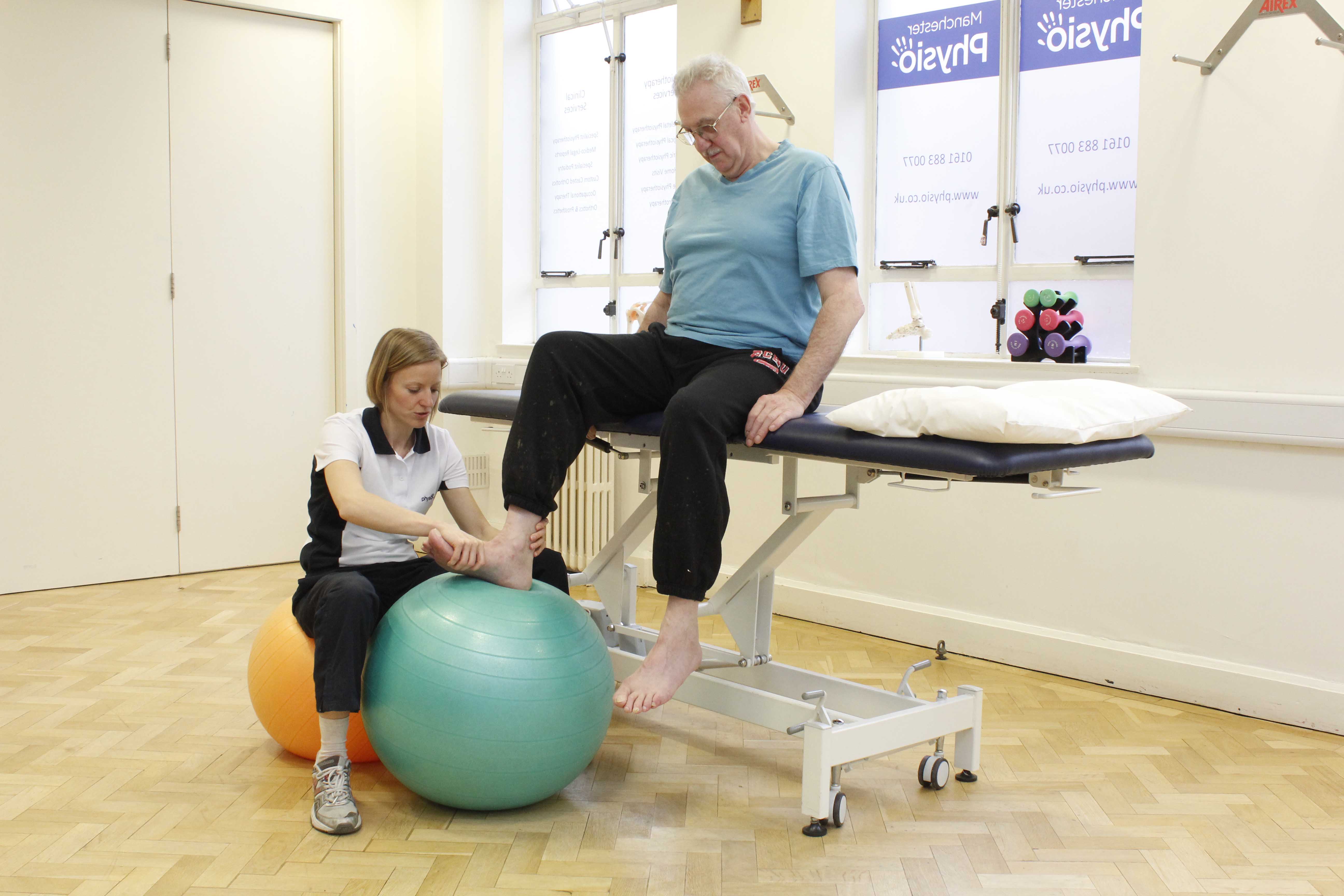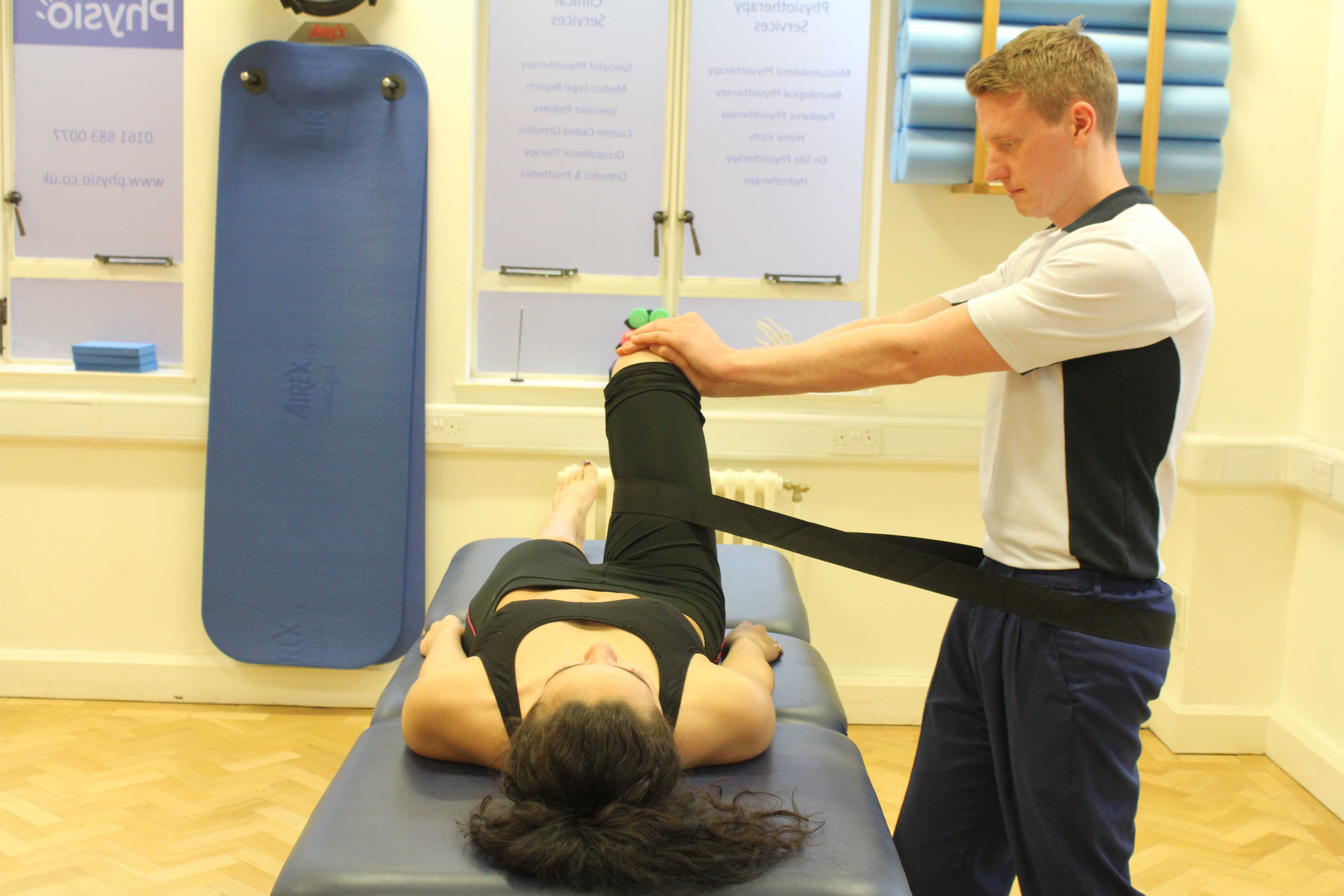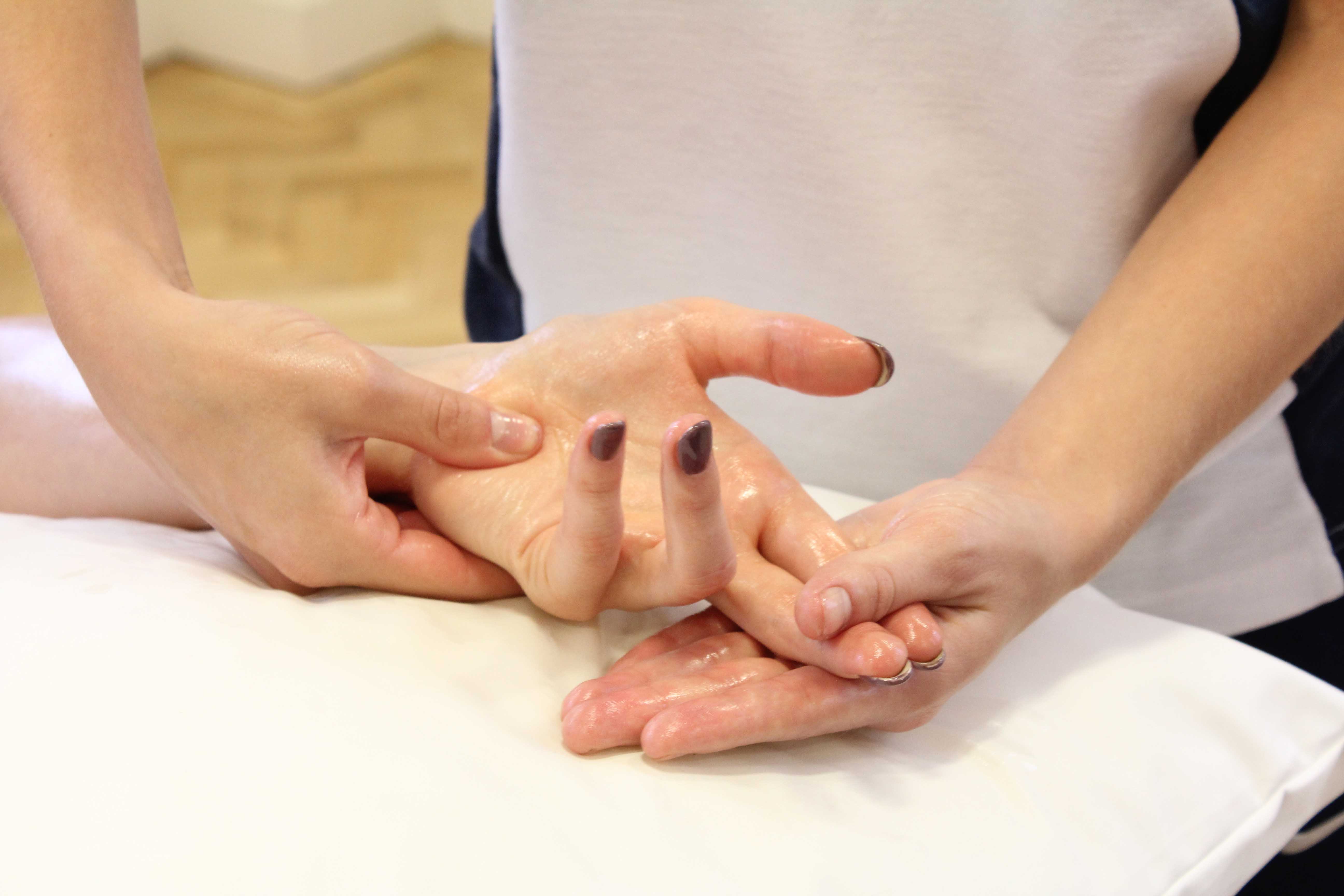What is arthritis?
Arthritis is a common condition that causes pain and swelling of the joints and bones. Physiotherapy is a very effective method to help reduce symptoms that are associated with Arthritis.
 Above: Stretches and mobilisations of the knee and ankle to relieve stiffness and pain
Above: Stretches and mobilisations of the knee and ankle to relieve stiffness and painJoints are where two bones meet allowing efficient movement and flexibility. The two bones of a joint are covered with a layer of hard, smooth tissue called cartilage which acts as protection during movements. Joints also consist of thick fluid that lubricates the ends of the bones to encourage smoother movements. This is called synovial fluid. Synovial fluid is produced by the synovium which surrounds the joint and provides joint stability. Surrounding muscles and ligaments provide movements and are also responsible for support and stability.
There are two main forms of arthritis that result in arthritis pain;
- Osteoarthritis
- Rheumatoid arthritis
Osteoarthritis
Osteoarthritis (OA) occurs after ongoing wear and tear of the affected joints caused by daily activities. In people experiencing OA, the joint does not repair properly which causes problems to occur. This faulty repair process causes the cartilage that protects the bones to become damaged and gradually waste away causing the bones to rub together during movement. The bone surfaces may then develop bony growths called osteophytes. OA can result in significant pain and inflammation which varies largely in severity and characteristics between sufferers. OA most commonly affects the hands, spine, knees and hips. Causes of OA include age, genetics, obesity, previous joint injury or deformity and overuse of a joint.
 Above: Mobilisation and joint distraction techniques to relieve pain and stiffness in the hip joint
Above: Mobilisation and joint distraction techniques to relieve pain and stiffness in the hip jointRheumatoid Arthritis
Rheumatoid arthritis (RA) is a rare but more severe form of arthritis. RA is believed to be an autoimmune disease where the body’s immune system produces antibodies that attack and destroy the body’s own tissues, in this case, the joints. RA results in reduced movement in the joints and the breakdown of cartilage and bone tissue. RA can cause severe pain and inflammation as well as significant damage and deformities in the affected joints. The most commonly affected joints are the ankles, feet, fingers, wrists and thumbs. The cause of RA is generally unknown but is thought to be partly due to genetics or certain factors that may trigger the immune system to attack the tissues of the joints.
 Above: Soft tissue massage and mobilisations of the hands and fingers to alleviate pain and stiffness
Above: Soft tissue massage and mobilisations of the hands and fingers to alleviate pain and stiffnessMain symptoms of arthritis
- Long term (chronic) pain that varies significantly in frequency, severity and characteristics
- Joint stiffness
- Joint inflammation that can vary in severity and joints present a lot larger than normal
- Joint deformity especially in rheumatoid arthritis
- Reduction of movements in the affected joint as a result of chronic pain, swelling and stiffness
- Poor mobility if lower limb joints are affected
- Poor function
- One joint or several joints may be affected
- Small lumps can develop in affected joints but are usually harmless
- Inflammation of surrounding soft tissues such as the tendons
- Anaemia, fever, fatigue and weight loss may occur in some cases.
- Muscle aches and pains
Physiotherapy for arthritis pain
Physiotherapy is an effective method of treatment that will help relieve the chronic pain that you are experiencing as a result of arthritis. Physio.co.uk has specialist physiotherapists who will aim to reduce your arthritis pain through a variety of treatment strategies. The main goals of your physiotherapy will be to reduce your pain, help with any stiffness of the affected joints, improve movement and maintain function. Your physiotherapist at Physio.co.uk will provide you with a thorough assessment and comprehensive treatment plan that is specific to you. Your physiotherapy will include:
- Pain control modalities
- Heat orcryotherapy (ice)
- Hydrotherapy
- Acupuncture
- Electrical stimulation:e.g. TENS
- Massage
- Basic cardiovascular exercises to help improve overall fitness and health levels
- Strengthening exercises to reduce muscular deconditioning
- Education on how to make lifestyle changes that may affect your condition
- Functional activities
- Postural advice for arthritic conditions that affect the spine
Summary
Arthritis is a common condition that causes pain and swelling of the joints and bones. There are two main forms of arthritis including osteoarthritis and rheumatoid arthritis. Osteoarthritis is primarily caused by wear and tear of the bone ends of a joint during movement and causes pain and swelling. Rheumatoid arthritis is more severe and occurs when the immune system attacks and destroys the body’s own tissues, in this case, the joints. This results in pain, swelling and deformity of the affected joints. Arthritis can affect any of the joints but is most commonly seen in hands, ankles, hips, knees, and the spine. Arthritis causes chronic pain which leads to reduced movement and function. Physiotherapy is an effective method to help reduce symptoms associated with arthritis. Specialist physiotherapists at Physio.co.uk aim to control pain, to reduce stiffness and to maintain or improve as much mobility and function in the affected areas as possible. Call Physio.co.uk now on 0330 088 7800 for more information or to book an appointment please contact us. You can also book online today!

 0330 088 7800
0330 088 7800


































